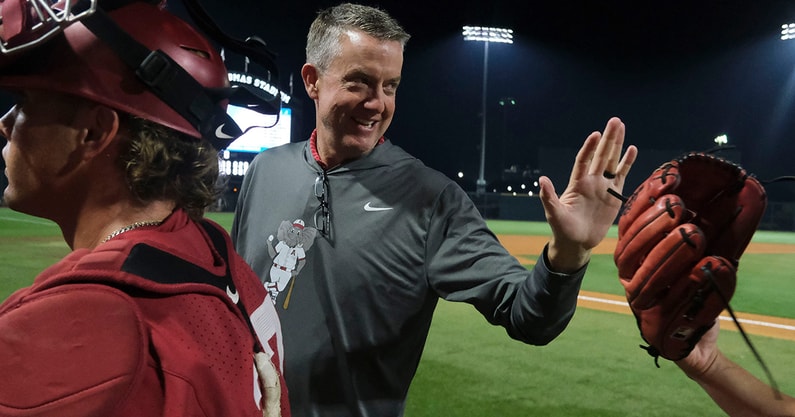Greg Byrne calls for federal NIL legislation, preserving 'enterprise' of college sports

The fight for federal NIL legislation took another turn this week as NCAA president Charlie Baker, Big Ten commissioner Tony Petitti and others testified in front of the Senate Judiciary Committee on Tuesday. The goal is to get Congress’ help finding a solution as the landscape continues to evolve.
During the 2.5 hours in front of the committee — the 10th such legislative hearing on NIL — the conversation became a referendum on college sports, as On3’s Eric Prisbell wrote. At one point, Sen. Lindsey Graham (R-SC) said college football is in “absolute chaos.”
There are various opinions about whether federal legislation for NIL is necessary. To Alabama athletics director Greg Byrne, it’s important for multiple reasons.
“I do think we need federal legislation because of the impacts in the areas that I said — from a Title IX standpoint … from [a] competition standpoint,” Byrne said on The Paul Finebaum Show on Friday ahead of Alabama vs. Tennessee. “Now, I think the steps with NIL have been positive in a lot of ways. One could argue, is it all market-based? Probably. Probably not, at times. Recruiting changes that. But what I want us to see is to be able to have legislation that gives us the protection to do things for young men and young women who have legitimate NIL opportunities out there.
“And at the same time, too, say, okay, we understand the Olympic movement is important. We understand opportunities for women in college sports is really important. And make sure that that’s part of how we focus in what we do make sure that college athletics — the enterprise as a whole — can stay healthy for a long time.”
Greg Byrne: Current NCAA rules create ‘two different entities that we’re working through’
Part of the reason Byrne is in favor of federal legislation is because of the current state of the NCAA and the rules that are currently in place. While he said it’s not entirely the association’s fault, he still said there’s a “balance” to be found.
Byrne also pointed to a 2007 example of what big wins can mean for universities to further his point.
Top 10
- 1Breaking
Nebraska cancels on Vols
2026 & 2027 football series between Tennessee & Nebraska has been canceled
- 2
Beck, Cavinder car case
Suspect arrested after theft
- 3Hot
Lincoln Riley
USC coach sits down with J.D. PicKell
- 4
Paul Finebaum
CFB is at very dangerous point
- 5
Bracketology update
No. 1 seeds change in update
Get the On3 Top 10 to your inbox every morning
By clicking "Subscribe to Newsletter", I agree to On3's Privacy Notice, Terms, and use of my personal information described therein.
“The NCAA gets beat up at times — some of it deserved. But some of it, hey, we helped create those rules,” Byrne said. “Managing the NCAA where one set of rules for Alabama is the same rules for a small school, it’s two different entities that we’re working through. So I hope there can be some balance to where we can recognize we do want the opportunity to compete and play against each other.
“You think about Boise State when they beat Oklahoma in the Fiesta Bowl. That was an incredible moment for that institution. Mark Few, the head basketball coach at Gonzaga, was my assistant coach when I played high school basketball. … But don’t lose sight of those opportunities for schools like that to have a chance.”
Why having NIL be ‘market-based and market-driven’ is good for ‘the enterprise of college sports’
One of Byrne’s biggest questions was what determines the value of NIL deals — if they’re market-based or market-driven. Either way, he said it’s not bad. In fact, he said the opposite. He thinks either would be a positive for the “enterprise.”
With that, he also said the institutions should be able to help make sure deals come to fruition.
“At the same time, too, we’re under constant legal pressure right now to create an environment that is sustainable for all the young men and young women of our program,” Byrne said. “And so, to have more institutional involvement from an NIL standpoint could be a healthy thing. But at the same time, too, to say, ‘Let’s have it be market-based and market-driven,’ is a good thing for the enterprise of college sports.
“I think the other part that would be good is to have the institutions making sure that these are good, legitimate NIL opportunities. You’ve seen some already where a young man, mostly, has been offered or promised something that didn’t happen. So it’s important to find that balance there.”